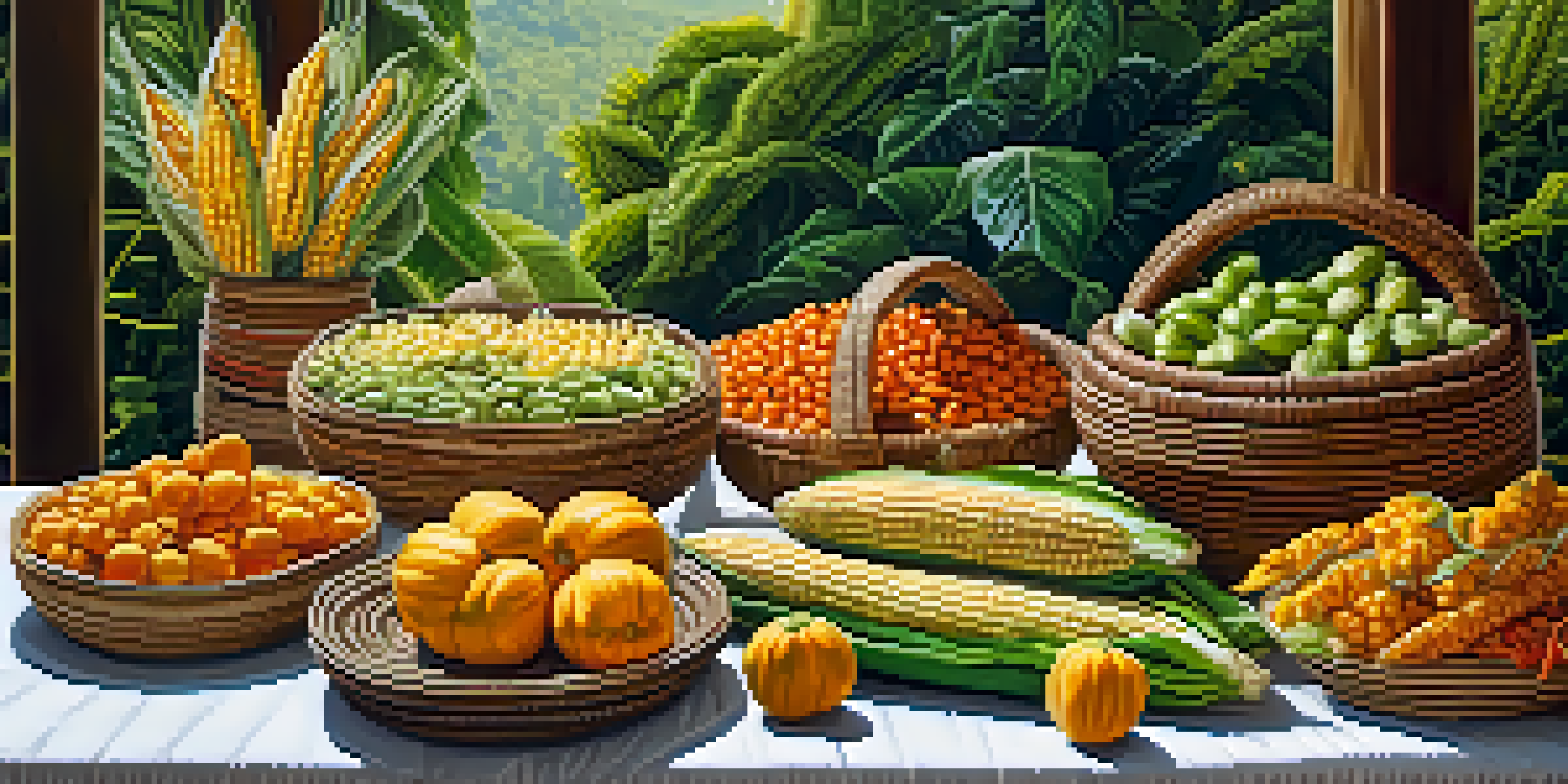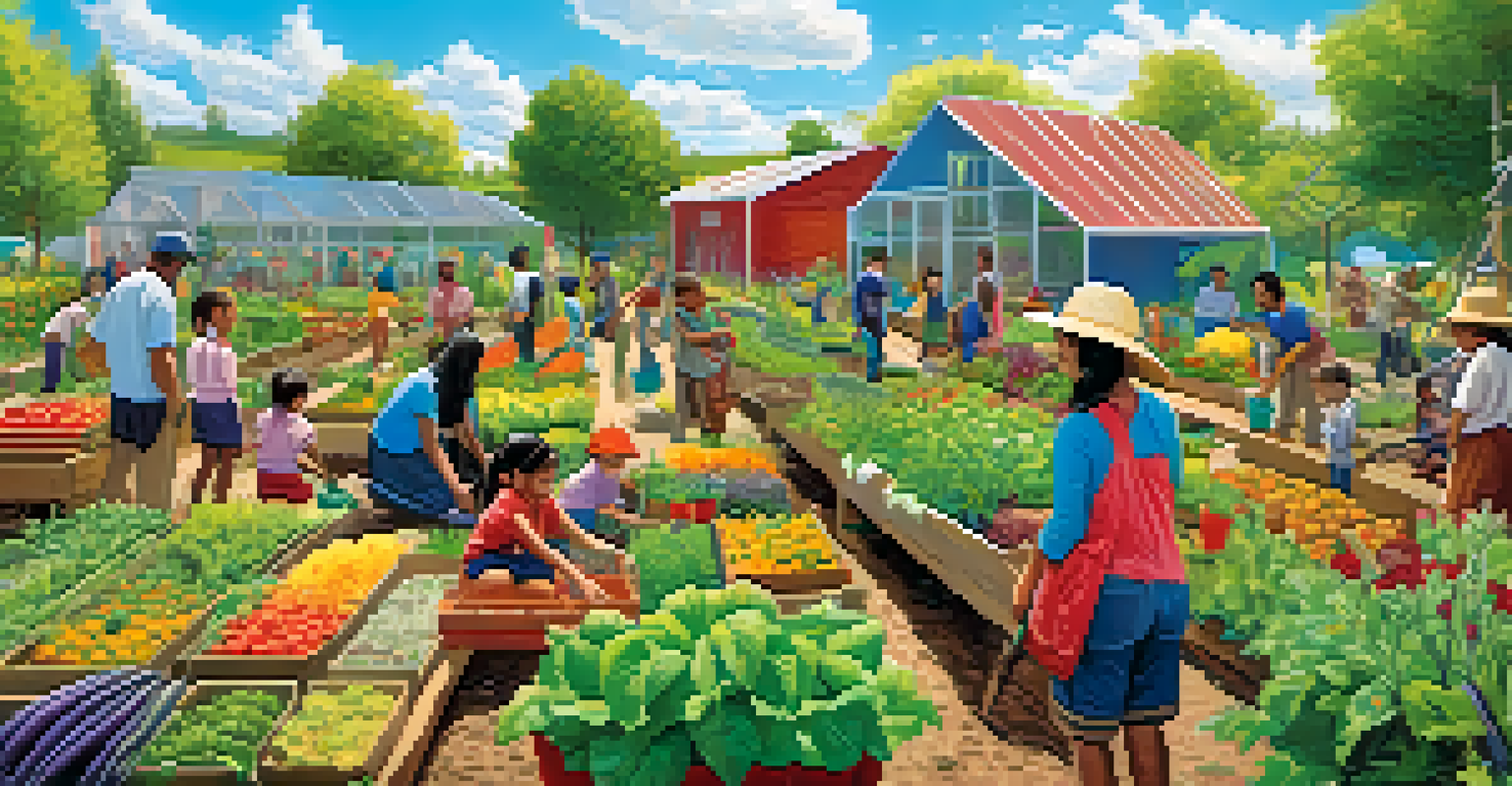The Role of Veganism in Indigenous Cultural Practices

Understanding Indigenous Cultural Practices and Values
Indigenous cultures are rich with traditions that often emphasize harmony with nature. This connection shapes their dietary practices, where food is not just sustenance but a spiritual experience. Many Indigenous communities view their relationship with food as a sacred bond, highlighting respect for all living beings.
We do not inherit the earth from our ancestors; we borrow it from our children.
These practices often involve seasonal harvesting and sustainable methods that have been passed down through generations. The careful selection of food is influenced by their environment, showcasing a deep understanding of local ecosystems. This relationship fosters a sense of stewardship towards the land and its resources.
As we delve into the role of veganism, it's essential to recognize that these cultural values can align with plant-based diets. The motivations for adopting veganism can mirror the Indigenous ethos of respecting life and preserving ecological balance, creating a fascinating intersection.
Veganism as a Modern Expression of Indigenous Values
In recent years, many Indigenous individuals have embraced veganism as a way to honor their cultural heritage. This choice reflects a commitment to sustainability and respect for animal life, which resonates with traditional practices. By adopting a vegan lifestyle, they express their values in a contemporary context.

For many, veganism is not merely a diet but a holistic approach to living that aligns with their spiritual beliefs. This alignment can be seen in the way traditional foods are reinterpreted, using plant-based ingredients to create familiar dishes. This creativity honors the past while adapting to modern dietary choices.
Veganism Reflects Indigenous Values
Many Indigenous individuals embrace veganism as a modern expression of their cultural heritage, emphasizing sustainability and respect for life.
The modern vegan movement also provides a platform for Indigenous voices, allowing them to share their narratives and advocate for environmental justice. By highlighting the connection between their cultural practices and veganism, they inspire others to consider the broader implications of their food choices.
Traditional Plant-Based Foods in Indigenous Diets
Indigenous diets have long included a variety of plant-based foods, showcasing the rich biodiversity of their regions. Staples like corn, beans, and squash, known as the 'Three Sisters,' are not only nutritious but also symbolize cooperation and balance in nature. These foods have been cultivated for centuries, reinforcing sustainable agricultural practices.
Food is not just what we eat; it is a way of life, a way of being in the world.
Many Indigenous communities also gather wild plants, fruits, and herbs, which play crucial roles in their culinary traditions. These foraged foods often hold cultural significance and are used in traditional ceremonies, connecting communities to their ancestors. The knowledge of these plants is deeply rooted in their cultural identity.
Thus, the foundation of a vegan diet can often be traced back to these traditional practices. By recognizing the importance of these foods, we can appreciate how Indigenous cultures have maintained a sustainable relationship with the earth long before veganism became a mainstream concept.
Cultural Significance of Animal Rights in Indigenous Traditions
In many Indigenous cultures, animals are regarded as relatives, deserving of respect and protection. This perspective fosters a sense of responsibility towards wildlife, influencing hunting and gathering practices. When animals are taken for food, rituals often accompany the act, honoring the spirit of the animal and acknowledging its sacrifice.
This worldview aligns with the principles of veganism, which advocates for the humane treatment of all living beings. Many Indigenous people see the adoption of veganism as a natural extension of their cultural practices, emphasizing compassion and interconnectedness. The idea is not just to avoid harm but to create a more just relationship with the world.
Plant-Based Foods in Traditions
Traditional Indigenous diets include a variety of plant-based foods, showcasing a long-standing relationship with nature and biodiversity.
By integrating these values into modern discussions about animal rights, Indigenous communities can offer a unique perspective. Their historical context enriches the conversation around veganism, encouraging a deeper understanding of ethical eating and its cultural implications.
Food Sovereignty and Veganism in Indigenous Communities
Food sovereignty is a key concept for many Indigenous communities, advocating for their right to define their food systems. This movement emphasizes the importance of local, sustainable food sources, which can include plant-based diets. By choosing veganism, Indigenous people can reclaim their food narratives and prioritize health and sustainability.
The push for food sovereignty aligns with the goals of the vegan movement, which often focuses on reducing reliance on industrial agriculture. By cultivating traditional crops and promoting local plant-based foods, Indigenous communities can enhance their food security and autonomy. This approach fosters resilience against external pressures and supports cultural preservation.
In this way, veganism becomes a tool for empowerment, allowing Indigenous peoples to reconnect with their heritage while addressing contemporary issues. This synergy between food sovereignty and veganism not only honors traditional practices but also paves the way for future generations.
Veganism's Impact on Indigenous Health and Well-Being
Health disparities are a significant concern for many Indigenous communities, often linked to dietary choices and access to nutritious foods. By adopting a vegan diet, individuals may experience health benefits, including improved heart health and reduced risk of chronic diseases. This shift can be particularly beneficial in communities struggling with diet-related illnesses.
Moreover, veganism can promote greater awareness of nutrition and wellness within Indigenous populations. Educational initiatives that focus on plant-based diets can empower individuals to make informed choices about their health. This knowledge not only supports physical well-being but also strengthens cultural identity through food.
Food Sovereignty and Empowerment
Veganism aligns with food sovereignty efforts in Indigenous communities, allowing them to reclaim their food narratives and promote health.
Ultimately, the integration of veganism into Indigenous practices offers a holistic approach to health. By prioritizing plant-based nutrition, communities can enhance their quality of life while honoring their cultural heritage.
Challenges and Misconceptions About Indigenous Veganism
Despite the rich connection between veganism and Indigenous practices, misconceptions often arise. Some may assume that Indigenous peoples cannot adopt veganism due to traditional hunting and gathering lifestyles. However, many Indigenous individuals are successfully merging their cultural heritage with modern dietary choices, demonstrating that flexibility is possible.
Additionally, there can be challenges related to food access and availability in Indigenous communities. Limited access to fresh produce can make it difficult to maintain a vegan diet. However, innovative solutions, such as community gardens and local food initiatives, are emerging to address these issues and promote healthier eating habits.

Understanding these challenges is crucial for fostering a supportive environment for those exploring veganism in Indigenous contexts. By acknowledging the complexities, we can engage in more meaningful discussions about food, culture, and health, ultimately supporting Indigenous voices and their choices.